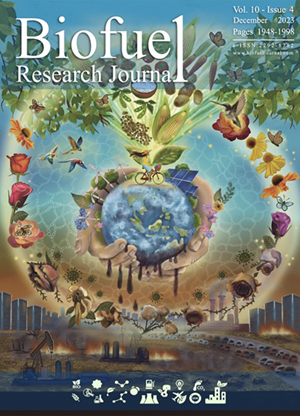以棕榈油为基础的食品、燃料和化学品精炼系统的可持续性评估
IF 14.4
Q1 ENERGY & FUELS
引用次数: 3
摘要
棕榈基生物炼制系统因其潜在的高经济效益而受到全世界的关注。然而,环境影响也随着产量的增加而增加。因此,本研究旨在评估(1)泰国现有的棕榈油生物炼制系统的可持续性,包括食用油和生物柴油;(2)棕榈油生物炼制系统的增值产品,即琥珀酸、乳酸、生物氢化柴油(BHD)和环氧氯丙烷(ECH),分别代表生物材料、生物燃料和生物化学产品。据此,设计了7种棕榈生物炼制方案,并通过生命周期评估(LCA)、净能量平衡(NEB)和净能量比(NER)、创造就业和生态效率对其可持续性进行了评估。结果表明,与现有系统相比,增值生产使全球变暖影响增加了约3 - 79%。虽然由于与增值产品生产有关的额外工艺增加了对环境的影响,但产品总价值也增加了,特别是琥珀酸,通常导致更高的生态效率值。在所有考虑的情景中,目前以棕榈为基础的琥珀酸生物炼制系统的生态效率最高。BHD生产方案具有最高的NEB和NER,因为产品用于能源。与现行制度相比,所有情景下的就业机会都增加了2 - 86%。本文章由计算机程序翻译,如有差异,请以英文原文为准。
Sustainability assessment of palm oil-based refinery systems for food, fuel, and chemicals
Palm-based biorefinery system has gained attention worldwide because of potentially high economic returns. However, environmental impacts also increase with the additional production. Therefore, this study aims to assess the sustainability of (1) current palm-based biorefinery system in Thailand, including cooking oil and biodiesel, and (2) palm-based biorefinery system with value-added products, i.e., succinic acid, lactic acid, bio-hydrogenated diesel (BHD), and epichlorohydrin (ECH) that represent biomaterial, biofuel, and biochemical products, respectively. Accordingly, seven palm-based biorefinery scenarios were designed, and their sustainability was assessed through life cycle assessment (LCA), net energy balance (NEB) and net energy ratio (NER), employment generation, and eco-efficiency. The results revealed that value-added production increased global warming impacts by around 3 – 79% compared with the current system. Although environmental impacts increased due to the additional processes related to the production of the value-added products, total product values also increased, especially for succinic acid, generally leading to higher eco-efficiency values. The current palm-based biorefinery system with succinic acid production had the highest eco-efficiency among all the scenarios considered. The BHD production scenario had the highest NEB and NER because the products were used for energy. Employment generation increased for all the scenarios between 2 – 86% compared with the current system.
求助全文
通过发布文献求助,成功后即可免费获取论文全文。
去求助
来源期刊

Biofuel Research Journal-BRJ
ENERGY & FUELS-
CiteScore
22.10
自引率
1.50%
发文量
15
审稿时长
8 weeks
期刊介绍:
Biofuel Research Journal (BRJ) is a leading, peer-reviewed academic journal that focuses on high-quality research in the field of biofuels, bioproducts, and biomass-derived materials and technologies. The journal's primary goal is to contribute to the advancement of knowledge and understanding in the areas of sustainable energy solutions, environmental protection, and the circular economy. BRJ accepts various types of articles, including original research papers, review papers, case studies, short communications, and hypotheses. The specific areas covered by the journal include Biofuels and Bioproducts, Biomass Valorization, Biomass-Derived Materials for Energy and Storage Systems, Techno-Economic and Environmental Assessments, Climate Change and Sustainability, and Biofuels and Bioproducts in Circular Economy, among others. BRJ actively encourages interdisciplinary collaborations among researchers, engineers, scientists, policymakers, and industry experts to facilitate the adoption of sustainable energy solutions and promote a greener future. The journal maintains rigorous standards of peer review and editorial integrity to ensure that only impactful and high-quality research is published. Currently, BRJ is indexed by several prominent databases such as Web of Science, CAS Databases, Directory of Open Access Journals, Scimago Journal Rank, Scopus, Google Scholar, Elektronische Zeitschriftenbibliothek EZB, et al.
 求助内容:
求助内容: 应助结果提醒方式:
应助结果提醒方式:


